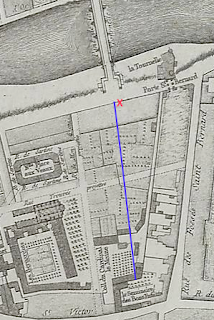Hard Facts About the Tour d’Argent
Since the Tour d’Argent reopened in 2023, a number of articles have appeared on the restaurant, most more or less reproducing the same article which repeats old undocumented tales about the restaurant. The one exception so far is Vivian Song’s article for the BBC, which cites two prominent food historians as challenging the restaurant’s claims (notably of having been founded in 1582 and frequented by Henry IV):
But what of Spang’s claim that the elite did not frequent the taverns and cabarets which preceded restaurants? Consider this contemporary account from 1598: “Tuesday the 22nd of this month, the King [Henry IV] returned from Fontainbleau to Paris and went to dine at the Little Moor, with his group, at 3 crowns a head.” (The Petit More was a famous cabaret of the time.) In another anecdote from 1601, the King was hungry from hunting and stopped at an inn, where he was told he had arrived too late to dine (he then tried to get a group which did not know him to share their roast with him, which they refused). Before this, in 1577 when he was still Henry of Navarre, he stopped at an inn in Barbaste; these meals were recorded at the time.
- Patrick Rambourg: "The notion of a restaurant as an establishment in the 16th Century doesn’t work… From the sources I’ve seen, I don’t see any mention of the Tour d’Argent until the 18th Century”.
- Rebecca Spang… “author of The Invention of the Restaurant: Paris and Modern Gastronomic Culture, points out that inns and taverns were patronised by travellers like religious pilgrims or merchants who had no other food options – not the elite and much less French royalty. ‘It wasn't a luxurious experience,’ she said.”
From Jaillot's 1775 map of Paris - with Rue du Cardinal LeMoine and current site of Tour d'Argent in color
- The restaurant’s current site, at the corner of the Quai de Tournelle and the Rue du Cardinal Lemoine, did not EXIST until late in the eighteenth century, when the rue Cardinal Lemoine was cut through what once had been a school.
- Until 1650, the quay where the restaurant stands was “often flooded and almost always made inaccessible by mud" – not exactly conducive to drawing an upscale crowd.
- In 1860, far from being described as an upscale restaurant, the restaurant was described as a cheap adjunct to a little hotel, “out of the way, it is true”.
- Until late in the nineteenth century, the restaurant did not appear in any of multiple lists of the best restaurants in Paris, such as this example from 1824.
- The French version adds that there were several other places called “Tour d’Argent” in the eighteenth century (the term “Silver Tower” was common in heraldry - a fact ignored by many who claim there was something "silvery" about the building itself).
But what of Spang’s claim that the elite did not frequent the taverns and cabarets which preceded restaurants? Consider this contemporary account from 1598: “Tuesday the 22nd of this month, the King [Henry IV] returned from Fontainbleau to Paris and went to dine at the Little Moor, with his group, at 3 crowns a head.” (The Petit More was a famous cabaret of the time.) In another anecdote from 1601, the King was hungry from hunting and stopped at an inn, where he was told he had arrived too late to dine (he then tried to get a group which did not know him to share their roast with him, which they refused). Before this, in 1577 when he was still Henry of Navarre, he stopped at an inn in Barbaste; these meals were recorded at the time.
So kings certainly DID eat at such places from time to time – even if there is absolutely no evidence that Henry ate at the Tour d’Argent or even that that particular Tour d’Argent existed at the time.
As for Rambourg’s complaint that restaurants didn’t exist before the eighteenth century, true enough, but the restaurant’s riposte that it was originally a different sort of establishment is not unthinkable; we have good evidence that people could eat well in inns, taverns and cabarets from the sixteenth century at least. It is just completely unproven in this case. It is also unlikely that he did find THIS Tour d’Argent in the eighteenth century. Rather, it is likely that he is referring to one of the several other Tours d’Argent mentioned above.
Finally, note this from Song’s article: “the current owner André Terrail stands by the claims, saying that the writings in their possession date the building – whether it was a hostel or an inn – to 1582.” Has he offered to share these historically important documents? Not so far.
Finally, note this from Song’s article: “the current owner André Terrail stands by the claims, saying that the writings in their possession date the building – whether it was a hostel or an inn – to 1582.” Has he offered to share these historically important documents? Not so far.
Personally, I won’t be holding my breath.



Comments
Post a Comment